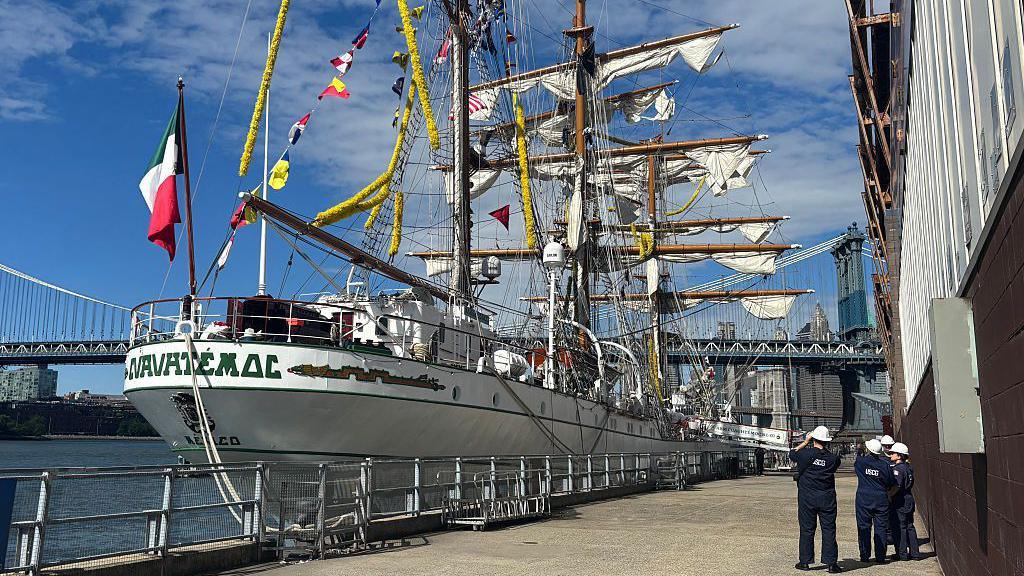The Cuauhtémoc Tragedy – A Crisis Management Perspective
Is this a crisis? From our perspective — absolutely. The real question is: how do you respond? What should have been done? What could have been done? In crisis communications, the questions come fast. Your answers must come faster. Read our crisis management insight now.
3 min read


May 17, 2025 - The Mexican Ship, Cuauhtémoc crashes the Brooklyn Bridge in New York, USA.
LODESTAR PR INSIGHT:
When Crisis Hits, Leadership Matters.
On May 17, 2025, we witnessed a tragic incident involving the Mexican Naval ship, Cuauhtémoc, which reversed into the Brooklyn Bridge in New York. Unfortunately, this incident claimed the lives of two crew members. Two cadets remain hospitalized in New York (as of the time of writing), and 19 others sustained injuries. The remaining seven officers and 172 cadets have since been safely repatriated to their naval school in Veracruz, Mexico.
How and Why Did This Tragedy Happen?
These are two critical questions that the Mexican Navy, as the responsible authority, must thoroughly investigate and address. While protocols and procedures vary across organizations, the foundation of any effective crisis response is grounded in responsibility, remorse, and empathy.
This is exactly why a crisis contingency plan matters. Anything can happen at any time. Such a plan provides those responsible with a clear roadmap — outlining essential actions, identifying key decision-makers, and setting strict timelines. In crisis management, time is everything.
Addressing a Crisis: Public Relations Perspective
Crisis management involves many layers, but today, we focus on public relations. Let’s examine how the Mexican Navy can address this tragedy from a communication standpoint.
1. Identifying Priority Audiences
In this case, the immediate priority is the victims themselves — the 277 personnel aboard the Cuauhtémoc and second in line are their families. With two confirmed fatalities, this incident is undeniably a major crisis.
Let’s explore these two audiences from a crisis PR standpoint.
2. Taking Responsibility & Offering Support
The Mexican Navy must take full responsibility and provide immediate support — covering funeral costs, medical expenses, and trauma care for all affected, without hesitation. A dedicated liaison team should be assigned to manage communications and logistics, from crisis response to recovery and reintegration.
Long-term mental health support is also crucial. The Navy should offer access to counselors and trauma care for at least six (6) months to a year, creating a safe space for victims to heal.
3. The Question of Compensation
“Compensation” is a powerful and sensitive word. Legal requirements vary by country — some mandate it, others leave it to discretion. While I'm not an expert in Mexican law, but from a PR standpoint, compensation is a clear expression of compassion.
The deceased may have been primary earners in their families. Losing them could mean a loss of livelihood. In such cases, compensation becomes not only appropriate, but necessary — it should nonetheless be evaluated on a case-by-case basis. In a legal perspective however, compensating could mean guilt.
4. Supporting the Families
Families of the victims must be kept informed first and accurately. The Navy should immediately establish a liaison communication channel, including a hotline and dedicated email, to ensure families receive timely updates and can ask questions.
Why is this important? Because in times of uncertainty, misinformation spreads quickly and can severely damage public trust. Timely and transparent communication helps maintain the Navy’s credibility and demonstrates empathy. As with the victims, affected families should also receive counseling and trauma support for at least six months, reinforcing the Navy’s role as a compassionate and responsible institution.
Remember: You already have a crisis on hand. The last thing you want is to create another by withholding information. In crisis PR, you either excel with action or cave with silence.
5. Honoring the Deceased
Though one deceased individual was a cadet and the other a crew member, both deserve an honorable memorial service. Given the nature of their deaths — in service, under a national flag, and in foreign waters — the Mexican Navy, in collaboration with the government, should consider holding an official service as a gesture of national respect.
Final Thoughts
There are many more stakeholders affected by this tragedy and numerous layers of response that need careful management. In my experience, no crisis team is ever fully prepared for the magnitude of a crisis — even with the most detailed contingency plan. But a strong pre-crisis plan serves as a vital guide.
At the end of the day, it’s the crisis team members — their skill, speed, and strategic thinking — who make the difference. Plans are important. People executing them are everything.
This article is an opinion piece.
Need a Crisis Partner You Can Rely On?
At LODESTAR PR, we specialize in crisis communication, stakeholder management, and media strategy — guiding brands through their toughest moments with clarity, empathy, and direction.
Let us lead you to the safe shore.
Reach out today to discuss your contingency plan or crisis response needs.
E: contact@lodestarpr.com
W: www.lodestarpr.com
T: +6012 3348 417
